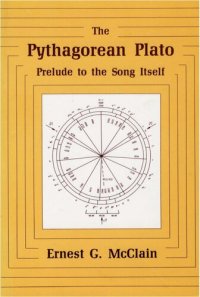
Ebook: The Pythagorean Plato: Prelude to the Song Itself
Author: Ernest G. McClain
- Tags: Pythagoras Music Plato Equal temperament Ancient Athens Atlantis
- Year: 1984
- Publisher: Nicolas-Hays
- City: York Beach, Maine
- Language: English
- pdf
There is something very special about this book as regards both method and contents.
Scholars in various fields—mathematics, philology, political science, education, philosophy, music—can profit from it significantly and in due time are likely to recognize it as essential to further thought in their respective–disciplines.
Plato’s dialogues abound in musical examples and their corresponding mathematical equations which have driven philologists and philosophers of the last two millennia to open despair.
Ernest G. McClain, a music professor [emeritus] at the City University of New York, has succeeded where angels either feared to tread or tripped.
His method is simple enough: he started by taking Plato literally.
He believed Plato’s statements concerning the supremacy of music: “Education in music is most sovereign” (Republic 501d).
“Argument mixed with music… alone, when it is present, dwells within the one possessing it as a savior of the virtue throughout life” (Republic 549b).
“Moderation” will stretch through the whole city as it does “from top to bottom of the entire scale, making the weaker, the stronger, and those in the middle… sing the same chant together” (Republic 432a).
“Our songs have become laws” (Laws 799d).
McClain’s method, in short consists in fully respecting Plato’s insistence on the musical interpretation of numbers, and in accepting and translating the somewhat clumsy Greek mathematical formulations.
The results, all of them intelligible to thinking musicians, are highly persuasive.
The contents emerge as various attempts at coordinating disparate elements to function in an orderly manner within a system.
Plato’s late dialogues form a continuity extending from the Republic through Timaeus and Critias to Laws.
In the face of Plato scholars who generally hesitate to elucidate one dialogue by another, McClain has had the courage to trace the musical connections [using] the ingenious idea of interpreting Plato’s three different relevant number sets as different kinds of musical temperament.
[His] analysis could not be more specific.
He supports every step in his logical chain by direct references to Plato’s own words.
McClain’s accomplishment strikes me as a major intellectual breakthrough in man’s perennial struggle with his own spiritual history.
Siegmund Levarie from a review in the July, 1978 issue of The Musical Quarterly
Scholars in various fields—mathematics, philology, political science, education, philosophy, music—can profit from it significantly and in due time are likely to recognize it as essential to further thought in their respective–disciplines.
Plato’s dialogues abound in musical examples and their corresponding mathematical equations which have driven philologists and philosophers of the last two millennia to open despair.
Ernest G. McClain, a music professor [emeritus] at the City University of New York, has succeeded where angels either feared to tread or tripped.
His method is simple enough: he started by taking Plato literally.
He believed Plato’s statements concerning the supremacy of music: “Education in music is most sovereign” (Republic 501d).
“Argument mixed with music… alone, when it is present, dwells within the one possessing it as a savior of the virtue throughout life” (Republic 549b).
“Moderation” will stretch through the whole city as it does “from top to bottom of the entire scale, making the weaker, the stronger, and those in the middle… sing the same chant together” (Republic 432a).
“Our songs have become laws” (Laws 799d).
McClain’s method, in short consists in fully respecting Plato’s insistence on the musical interpretation of numbers, and in accepting and translating the somewhat clumsy Greek mathematical formulations.
The results, all of them intelligible to thinking musicians, are highly persuasive.
The contents emerge as various attempts at coordinating disparate elements to function in an orderly manner within a system.
Plato’s late dialogues form a continuity extending from the Republic through Timaeus and Critias to Laws.
In the face of Plato scholars who generally hesitate to elucidate one dialogue by another, McClain has had the courage to trace the musical connections [using] the ingenious idea of interpreting Plato’s three different relevant number sets as different kinds of musical temperament.
[His] analysis could not be more specific.
He supports every step in his logical chain by direct references to Plato’s own words.
McClain’s accomplishment strikes me as a major intellectual breakthrough in man’s perennial struggle with his own spiritual history.
Siegmund Levarie from a review in the July, 1978 issue of The Musical Quarterly
Download the book The Pythagorean Plato: Prelude to the Song Itself for free or read online
Continue reading on any device:

Last viewed books
Related books
{related-news}
Comments (0)